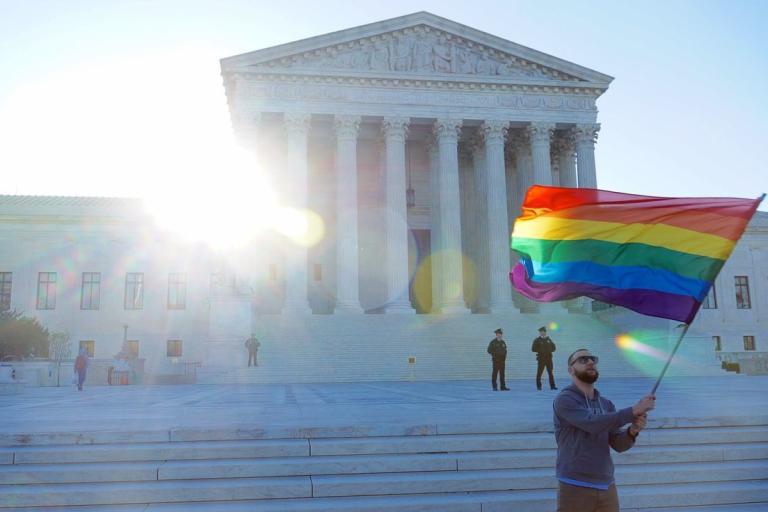Until recently, most circuit courts to address the issue had concluded that claims of sexual orientation discrimination are not cognizable under Title VII. See e.g., Higgins v. New Balance Athletic Shoe, Inc., 194 F.3d 252, 259 (1st Cir. 1999) (“we regard it as settled law that, as drafted and authoritatively construed, Title VII does not proscribe harassment simply because of sexual orientation”); Pagan v. Holder, 430 F. App’x 170, 171 (3d Cir. 2011) (“discrimination based on sexual orientation is not [cognizable under Title VII]”; Wrightson v. Pizza Hut of Am., Inc., 99 F.3d 138, 143 (4th Cir. 1996) (“Title VII does not afford a cause of action for discrimination based upon sexual orientation . . . .”); Blum v. Gulf Oil Corp., 597 F.2d 936, 938 (5th Cir. 1979) (“[d]ischarge for homosexuality is not prohibited by Title VII”); Kalich v. AT & T Mobility, LLC, 679 F.3d 464, 471 (6th Cir. 2012) (“discrimination based upon a person's sexual orientation cannot form the basis of a cognizable claim [under Michigan law or Title VII]”); Williamson v. A.G. Edwards & Sons, Inc., 876 F.2d 69, 70 (8th Cir. 1989) (“Title VII does not prohibit discrimination against homosexuals.”); Medina v. Income Support Div., 413 F.3d 1131, 1135 (10th Cir. 2005) (“Title VII's protections, however, do not extend to harassment due to a person's sexuality.”); Fredette v. BVP Mgmt. Assocs., 112 F.3d 1503, 1510 (11th Cir. 1997) (“We do not hold that discrimination because of sexual orientation is actionable.”).
The previous rule in the Second Circuit, set forth in Simonton v. Runyon, 232 F.3d 33 (2d Cir. 2000), and Dawson v. Bumble & Bumble, 398 F.3d 211 (2d Cir. 2005), was that such claims may not be heard. In late May 2017, however, the court granted an en banc request by the estate of Donald Zarda, a skydiving instructor who was allegedly fired by Altitude Express, Inc. because a customer complained about his sexuality. The Second Circuit’s review of the issue followed a decision by the Seventh Circuit, which in April 2017, became the first court of appeals to hold that the Civil Rights Act of 1964 applies to discrimination on the basis of sexual orientation.
The Seventh Circuit, on an 8-3 vote in Kimberly Hively v. Ivy Tech Community College, 853 F.3d 339 (7th Cir. 2017), reversed a prior ruling by that court in 2016. The ruling held that the Seventh Circuit adhered to its stance even though the determination admittedly created “a paradoxical legal landscape in which a person can be married on Saturday and then fired on Monday.” Id. at 342. The Second Circuit’s subsequent willingness to consider whether Title VII protects against discrimination based on sexual orientation signaled that it might, too, soon reverse its position.
Given that en banc review is rarely granted, to do so in the Zarda litigation was a good indication that the Second Circuit would at least seriously reconsider, if not outright reverse, its current position. This was despite the fact that, in a decision on June 28, 2017, the Second Circuit denied, without comment, a request for panel rehearing or alternatively en banc review in a similar case. Issued only a month after stating that it would reconsider Zarda, the Court’s refusal to grant the same request in Matthew Christiansen v. Omnicom Group Inc., 852 F.3d 195 (2d Cir. 2017), was confusing.
Christiansen involved a HIV-positive advertising executive who sued Omnicom and various individuals for discrimination. In March 2017, the Second Circuit held that he could pursue a Title VII claim for not conforming to “male stereotypes.” The court received a number of amicus briefs from Fortune 500 companies, such as Google, Microsoft, Viacom Inc., Ben & Jerry’s, CBS Corp., Levi Strauss & Co., and Lyft Inc., as well as the U.S. Equal Employment Opportunity Commission, all arguing for en banc review and for the reversal of Simonton and Dawson. (The U.S. Justice Department, taking a view contrary to that of the EEOC, filed a brief stating its disagreement, arguing that Title VII does not reach sexual orientation discrimination and that any change will require action by Congress.)
These entities followed upon Judge Katzmann’s separate concurrence, in which he urged the court to reconsider its current rule. In doing so, Judge Katzmann noted that, logically, discrimination on the basis of sexual orientation is discrimination on the basis of sex:
[A]ssume that an employer suspends a lesbian employee for displaying a photo of her female spouse on her desk, but does not suspend a male employee for displaying a photo of his female spouse on his desk. The lesbian employee in that example can allege that her employer took an adverse action against her that the employer would not have taken had she been male. That is a legitimate claim under Title VII that sex was unlawfully taken into account in the adverse employment action.
Christiansen, 852 F.3d at 203 (quoting Baldwin v. Foxx, 2015 EEOPUB LEXIS 1905, at *14-15 (E.E.O.C. July 16, 2015)).
Judge Katzmann further observed that the alleged discrimination is a form of prohibited discrimination on the basis of association, citing Loving v. Virginia and stating that:
[o]nce we accept this premise it makes little sense to carve out same‐sex relationships as an association to which these protections do not apply, particularly where, in the constitutional context, the Supreme Court has held that same‐sex couples cannot be ‘lock[ed] . . . out of a central institution of the Nation’s society’. . . .
Id. at 204.
He concluded that “[i]f it is race discrimination to discriminate against interracial couples, it is sex discrimination to discriminate against same‐sex couples.” Id.
Judge Katzmann found a third basis, namely that discrimination on the basis of sexual orientation, is prohibited under Title VII because it is prohibited under Price Waterhouse v. Hopkins, 490 U.S. 228 (1989), as impermissible gender stereotyping: “[N]egative views of sexual orientation,” he said, “are often, if not always, rooted in the idea that men should be exclusively attracted to women and women should be exclusively attracted to men—as clear a gender stereotype as any.” 852 F.3d at 206.
In retrospect, it may be that the Second Circuit viewed it unnecessary to grant en banc review in Christiansen since the case returned to the district court on a Title VII claim. Now that the Second Circuit has decided to reverse its binding precedent, after en banc review in Zarda, that ruling will ostensibly apply if Christiansen is pending in the district court or on further appeal, so that the Title VII claim as to sexual orientation could be revived. Still, the mixed signals at the time seemed odd, and the outcome of the en banc review remained uncertain.
In subsequent developments, on July 7, 2017, the Eleventh Circuit declined to reverse its position in Evans v. Georgia Regional Hospital, 850 F.3d 1248 (11th Cir. 2017), petition for en banc review denied. Even before the new Second Circuit ruling, a circuit split was already evident, and when Evans announced that she would file a petition for certiorari with the Supreme Court, https://www.lambdalegal.org/in-court/cases/ga_evans-v-ga-regional-hospital, many commentators expected the Court to hear the case, but it declined.
The Second Circuit in its February 26 ruling used emphatic language in declaring that, “[laws] often go beyond the principal evil to cover reasonably comparable evils.” [LL1] Zarda v. Altitude Express, Inc., No. 15-3775, 2018 U.S. App. LEXIS 4608, at *26 (2d Cir. Feb. 26, 2018). The court tracked and used much of the same language as previously stated by Judge Katzmann, including the “comparative test” asking “whether an employee’s treatment would have been different but for that person’s sex.” Id. at *19. The court reasoned that Zarda would have presumably kept his job if he were female, but lost it because he was sexually attracted to other men. Accordingly, he would not have been discriminated against but for his sex. This is because “sexual orientation discrimination is motivated, at least in part, by sex and is thus subset of sex discrimination.” Id. In order to “identify the sexual orientation of a particular person,” the employer must “know the sex of the person and that of the people to whom he or she is attracted.” Id. at *21. Another justification used by the court is that homosexuals are stereotyped as the “ultimate case of failure to conform to gender stereotypes.” Id. at *118. Hence, discrimination on the basis of sexual orientation is “sex stereotyping” and prohibited under Title VII. Finally, Judge Katzmann returned to the Loving v. Virginia principle, noting that “[i]f a male employee married to a man is terminated because his employer disapproves of a same-sex marriage, the employee has suffered associational discrimination based on his own sex.” Id. at *47-48. That discrimination impermissibly occurs because “the fact that the employee is a man instead of a woman motivated the employer’s discrimination against him.” Id. at *48 (quoting Baldwin v. Foxx, 2015 EEOPUB LEXIS 1905, at *17 (E.E.O.C. July 16, 2015).
Only three judges disagreed, with two Republican appointees in the majority. The Zarda defendants have announced that they will not seek certiorari, but as the circuit split continues, it is likely the Supreme Court will have another opportunity, at some point, to take up the issue. For now, in New York State, Connecticut, and Vermont, the law is, finally, unambiguous.


